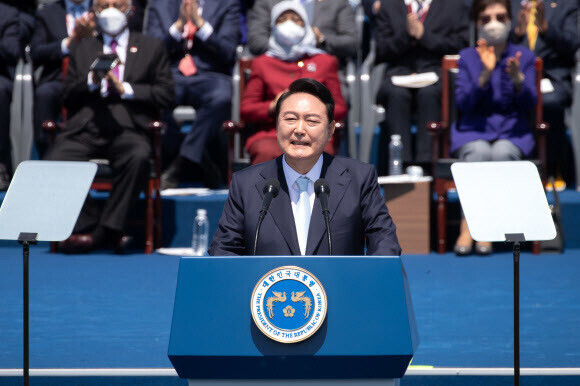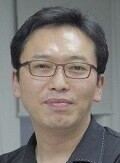hankyoreh
Links to other country sites 다른 나라 사이트 링크
[Column] To whose “freedom” does Yoon refer?


Yoon Suk-yeol’s inaugural address as South Korean President was awash with “freedom” in both quantitative and qualitative terms. Speaking for a little over 16 minutes, he mentioned the word 35 times, proclaiming it as an unparalleled value that would rescue not just the Republic of Korea but humankind.
But much like a Japanese haiku, Yoon’s address was also a kind of empty symbol that sought to leave behind the bounds of language.
His message was merely a call for “the people” and “the citizens” to rediscover and properly recognize the value of freedom — while remaining quite silent about things like how freedom could heal polarization and social conflicts, or how it necessarily relates to the science, technology, and innovation that make progress and rapid growth possible. The vast spaces in between the lines, which would have been difficult to fill with some kind of generous explanation, were left instead to be filled by the “ladies and gentlemen” he appealed to five times.
It seems impossible anyway to offer any complete formula to reconstruct the abrupt leaps that arose among those fragmented concepts, each of them operating in its own space. Some read them as decrying a severe crisis of democracy retreating into “anti-intellectualism”; others saw them as showing a commitment to playing an active role in restructuring the global order around the forces of “freedom.”
Eighty percent was dream interpretation, the other 20 percent a judgment on impressions. It wouldn’t be at all strange for it to be contrary to or distant from reality.
For instance, a paper titled “Is Korea Vulnerable to Democratic Backsliding?” published in January by Stephan Haggard, an eminent political scientist and distinguished professor at the University of California, San Diego, found that indicators of South Koreans’ political rights and civic freedoms regressed slightly under the Lee Myung-bak and Park Geun-hye administrations before recovering to a global standard under the Moon Jae-in presidency.
To be sure, political indicators are often out of touch with the reality of life, as with economic indicators such as per capita gross national income. But this sudden mentioning of “freedom” as some kind of panacea — from someone who had previously projected his pessimistic will on reality — seems to have come out of absolutely nowhere.
The reason Yoon made so many references to “citizens of the world” may be because he hopes the solutions he presented will be taken up by the international community as well. But it’s quite divorced from the current global trends and the pattern of countries around the world now entering a “post-neoliberalism era.”
As Paulo Gerbaudo observes in “The Great Recoil,” the dominance of neoliberalism for over three decades entered decline in the wake of the global financial crisis of 2008, and the hegemony battle between left and right over who gets to take its place has centered mainly around populism and protection-oriented neo-nationalism.
Developments on the right wing, with the election of Donald Trump as US President and the UK’s referendum approving Brexit, and the emergence of a new form of socialism symbolized by figures like Bernie Sanders in the US and Jeremy Corbyn in the UK, are both characterized by populist leanings.
While the left and right may be at odds over whether it’s society or the propertied that should be protected, they share protection-oriented neo-nationalist qualities in the value they place on state intervention. Both of them view neoliberalism as the “enemy.”
Neoliberalism hasn’t completely exited the stage, of course. It still flaunts its brutal vigor. Still, it can’t be denied that it’s in its twilight.
Yoon prides himself on having read the work of neoliberal economists like Milton Friedman in his youth, and his inaugural address bore the marks of the doctrine that freedom of capital will lead to growth that brings happiness to everyone.
But he also vastly outstripped the opposition when it came to the populist messaging of his election campaign, as with his calls for abolishing the Ministry of Gender Equality and Family. That sort of dichotomy makes his inaugural address read like a solemn joke.
“Anyone will know / who has ever flown / for freedom / What the skylark saw / before singing its song / How within freedom / the smell of blood is mixed.”
The “smell of blood” mentioned in the poem “The Blue Sky” by Kim Soo-young strongly hints that freedom is not some freely granted beneficence.
When Jean-Jacques Rousseau named the “general will” as a prerequisite for freedom, he limited its agency to the male members of the bourgeoisie, who were seen as possessing infinite information capabilities and superior judgment and reason. Within liberalism, there is always the absence of freedom.
Perhaps Yoon was anticipating all the sublime pathos associated with “freedom” when he invoked it in his address. But to judge from the way he has consistently spoken and behaved, it does not seem unrealistic to fear that some blood might have to be shed to prevent us from sliding into an illiberal abyss.
Rather than trying to parse his address, we should be asking the question: Whose freedom is it?
Please direct questions or comments to [english@hani.co.kr]

Editorial・opinion
![[Correspondent’s column] The real reason the US is worried about Chinese ‘overcapacity’ [Correspondent’s column] The real reason the US is worried about Chinese ‘overcapacity’](https://flexible.img.hani.co.kr/flexible/normal/500/300/imgdb/original/2024/0510/5217153290112576.jpg) [Correspondent’s column] The real reason the US is worried about Chinese ‘overcapacity’
[Correspondent’s column] The real reason the US is worried about Chinese ‘overcapacity’![[Editorial] Yoon’s gesture at communication only highlights his reluctance to change [Editorial] Yoon’s gesture at communication only highlights his reluctance to change](https://flexible.img.hani.co.kr/flexible/normal/500/300/imgdb/original/2024/0510/7717153284590168.jpg) [Editorial] Yoon’s gesture at communication only highlights his reluctance to change
[Editorial] Yoon’s gesture at communication only highlights his reluctance to change- [Editorial] Perilous stakes of Trump’s rhetoric around US troop pullout from Korea
- [Guest essay] Preventing Korean Peninsula from becoming front line of new cold war
- [Column] The state is back — but is it in business?
- [Column] Life on our Trisolaris
- [Editorial] Penalties for airing allegations against Korea’s first lady endanger free press
- [Editorial] Yoon must halt procurement of SM-3 interceptor missiles
- [Guest essay] Maybe Korea’s rapid population decline is an opportunity, not a crisis
- [Column] Can Yoon steer diplomacy with Russia, China back on track?
Most viewed articles
- 1Korea likely to shave off 1 trillion won from Indonesia’s KF-21 contribution price tag
- 2Nuclear South Korea? The hidden implication of hints at US troop withdrawal
- 3[Editorial] Perilous stakes of Trump’s rhetoric around US troop pullout from Korea
- 4With Naver’s inside director at Line gone, buyout negotiations appear to be well underway
- 5In Yoon’s Korea, a government ‘of, by and for prosecutors,’ says civic group
- 6[Column] ‘Choson’: Is it time we start referring to N. Korea in its own terms?
- 7‘Free Palestine!’: Anti-war protest wave comes to Korean campuses
- 8How many more children like Hind Rajab must die by Israel’s hand?
- 9Overseeing ‘super-large’ rocket drill, Kim Jong-un calls for bolstered war deterrence
- 10[Photo] ‘End the genocide in Gaza’: Students in Korea join global anti-war protest wave